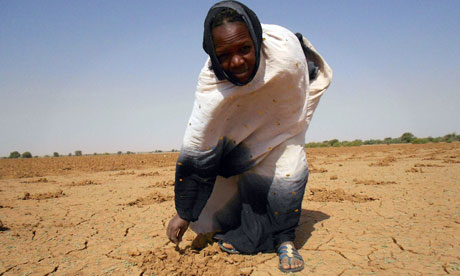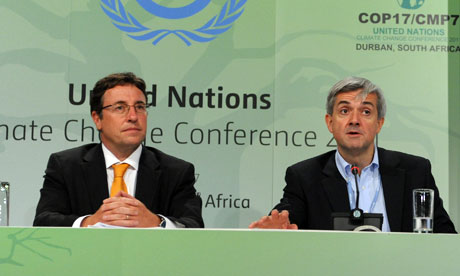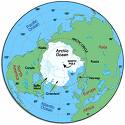The Globalization of War
The "Military Roadmap" to World War III
Michel Chossudovsky and Finian Cunningham (Editors)
December 2011
INTRODUCTION
[scroll down for Reader's Table of Contents]
The Pentagon’s global military design is one of world conquest.
The military deployment of US-NATO forces is occurring in several regions of the world simultaneously.
The concept of the “Long War” has characterized US military doctrine since the end of World War II. The broader objective of global military dominance in support of an imperial project was first formulated under the Truman administration in the late 1940s at the outset of the Cold War.
Bush Senior had envisaged a world of "peaceful international co-operation", one which was no longer locked into the confrontation between competing super powers, under the shadow of the doctrine of "Mutually Assured Destruction" (MAD) which had characterized the Cold War era.
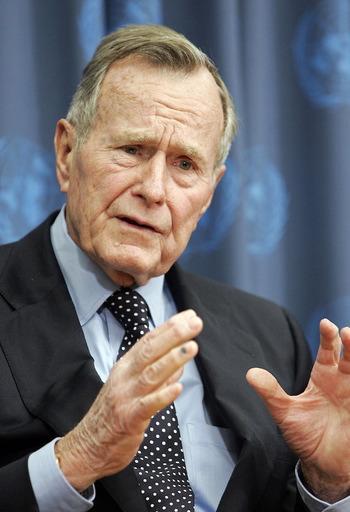
George H Walker Bush addressed a Joint Session
of the US Congress and the Senate, September 1990
Bush declared emphatically at the outset of what became known as "the post-Cold War era" that:
“a new partnership of nations has begun, and we stand today at a unique and extraordinary moment. The crisis in the Persian Gulf, as grave as it is, also offers a rare opportunity to move toward an historic period of cooperation. Out of these troubled times… a new world order can emerge: A new era freer from the threat of terror, stronger in the pursuit of justice and more secure in the quest for peace. An era in which the nations of the world, east and west, north and south, can prosper and live in harmony.”Of course, speeches by American presidents are often occasions for cynical platitudes and contradictions that should not be taken at face value. After all, President Bush was holding forth on international law and justice only months after his country had invaded Panama in December 1989 causing the deaths of several thousand citizens – committing crimes comparable to what Saddam Hussein would be accused of and supposedly held to account for. Also in 1991, the US and its NATO allies went on to unleash, under a “humanitarian” mantle, a protracted war against Yugoslavia, leading to the destruction, fragmentation and impoverishment of an entire country.
Nevertheless, it is instructive to use Bush Senior’s slanted vision of a “New World Order” as a reference point for how dramatically the world has changed in the intervening 20 years of the so-called post-Cold War era, and in particular how unilaterally degenerate the contemporary international conduct of the US has become under the Clinton, G. W. Bush Junior and Obama administrations.
Bush Senior's "promise" of world peace has opened up, in the wake of the Cold War, an age of continuous warfare accompanied by a process of economic dislocation, social devastation and environmental degradation.
In a bitter irony, this concept of peaceful international co-operation and partnership was used as a pretext to unleash The Gulf War, which consisted in "defending the sovereignty" of Kuwait and “upholding international law” following the Iraqi 1990 invasion.
Global Warfare
We are dealing with a global military agenda, namely “Global Warfare”. Far from a world of peaceful cooperation, we are living in a dystopian world of permanent wars – wars that are being waged in flagrant contravention of international law and against public opinion and interest.
Far from a “new era more secure in the quest for peace” we may see a world more akin to George Orwell’s 1984, dominated by perpetual conflict, insecurity, authoritarian surveillance, doublethink and public mind control.

A problem for many citizens is that “doublethink and mind control” have become so deeply embedded and disseminated by the mass media, including the so-called quality free press, such as The New York Times and The Guardian.The Post 9/11 Era: America's Doctrine of Pre-emptive Warfare
Allegedly sponsored by Al Qaeda, the 9/11 attacks on the World Trade Center and Pentagon played a central role in molding public opinion. One of the main objectives of war propaganda is to "fabricate an enemy". The "outside enemy" personified by Osama bin Laden is "threatening America".
Pre-emptive war directed against "Islamic terrorists" is required to defend the Homeland. Realities are turned upside down: America is under attack.
In the wake of 9/11, the creation of this "outside enemy" served to obfuscate the real economic and strategic objectives behind the American-led wars in the Middle East and Central Asia. Waged on the grounds of self-defense, the pre-emptive war is upheld as a "just war" with a humanitarian mandate.

"The Outside Enemy" Osama bin Laden, portrayed by the mainstream
media
From the outset of the Soviet-Afghan war in the early 1980s, the US intelligence apparatus has supported the formation of the "Islamic brigades". Propaganda purports to erase the history of Al Qaeda, drown the truth and "kill the evidence" on how this "outside enemy" was fabricated and transformed into "Enemy Number One".The US intelligence apparatus has created it own terrorist organizations. And at the same time, it creates its own terrorist warnings concerning the terrorist organizations which it has itself created. Meanwhile, a cohesive multibillion dollar counterterrorism program "to go after" these terrorist organizations has been put in place.
Instead of “war” or “state terrorism”, we are told of “humanitarian intervention” directed against "terrorists".
Instead of “offence”, we are told of “defense” or “protection”.
Instead of “mass murder” we are told of “collateral damage”.
A good versus evil dichotomy prevails. The perpetrators of war are presented as the victims. Public opinion is misled: “We must fight against evil in all its forms as a means to preserving the Western way of life.”
Breaking the "Big Lie" which presents war as a humanitarian undertaking, means breaking a criminal project of global destruction, in which the quest for profit is the overriding force. This profit-driven military agenda destroys human values and transforms people into unconscious zombies.
Spawning Militarism: "War is Normal"
In truth, as this new Interactive Reader from Global Research will demonstrate, we are living in an era hallmarked by “The Globalization of War” conducted by the very states that proclaim to be defenders of democratic rights and international law.
The chief protagonist of this globalized war is the United States of America. The US, along with its allies in the North Atlantic Treaty Organization (NATO), Britain, France, Canada and Germany among others, as well as an array of proxies – such as the Persian Gulf Arab states – is now emboldened to strike militarily in any region of the world.
It should be noted that on a tour of the Asia-Pacific region in November 2011, US President Barack Obama’s rhetoric was laden with bellicose statements towards China, citing the latter as a military threat to the hemisphere that the United States was ready to confront. Obama’s aggressive rhetoric towards Beijing should have been widely seen as unprecedented and unacceptable. But from a reading of the Western mainstream media, the warmongering by the US president was somehow made into normal, reasonable discourse.
This spawning militarism is rationalized with a variety of seemingly palatable pretexts: securing the world against "Islamic terrorism", as in Afghanistan; securing the world against "weapons of mass destruction", as in Saddam’s Iraq and currently Iran; defending human rights, as in Libya; humanitarian intervention, as in Somalia; and protecting small nations, as in confronting China on behalf of Southeast Asian states, or constructing a Ballistic Missile Defense system along the Eastern European borders of Russia. And again, the Western mainstream media plays a huge role in rationalizing the irrational, normalizing the abnormal, justifying the unjustifiable – akin to the Ministry of Truth in Orwell’s 1984.
We may accept these pretexts at face value and attempt to “normalize” a world of seemingly chaotic conflicts, as the Western mainstream media would have us. Or we can choose to see the world as it really is, that is, one where such wars and war-making are correctly understood as abominations of international law and human relations.
It is our objective in this Interactive Reader to help citizens free themselves from the indoctrinated doublethink of “wars as normal”. In a global survey, we will show that the US and its allies are fulfilling an agenda of “full spectrum dominance” in which no nation deemed to be obstructing that agenda for domination by the US and its allies is tolerated, and is in fact made a target for war.
The dynamic for globalized war has deep historical roots in the imperialism of capitalist governments. Rivalry for the raw materials of capitalist economies and geopolitical control were at the root of World Wars I and II - See the essays by Jacques Pauwels on the role of corporate America in supporting both Britain and Nazi Germany. The same impetus lay behind countless invasions and proxy wars in Latin America, Asia and Africa by the US since World War II under the guise of “defending the free world from the Evil Soviet empire”.
But with the collapse of the Soviet Union as a countervailing power, the US and its allies have become uninhibited over the past two decades to “go it alone” to assert imperial dominance. This dynamic has only been reinforced by the economic exhaustion of the capitalist powers since the onset of the financial crisis of 2008. Indeed, the rise of militarism can be seen as a compensatory corollary of their economic demise – a demise that is structural and deeply protracted beyond anything that may be deemed as the usual “end of business cycle”. We are perhaps witnessing an historic collapse in the capitalist system far greater in scope than the Great Depression. And with that, disturbingly, the rise of militarism takes on a much greater significance.
Crucial to the global control of resources are the raw materials of energy: oil and gas. Whether it is wars in Iraq, Afghanistan or Libya, or confrontation with Iran, China, Russia and Venezuela, the fundamental point of contention is control over this lifeblood of the capitalist economy. All other espoused pretexts are mere window dressing, regardless of what the mainstream media would have us believe.
World War III Scenario
The launching of an outright war using nuclear warheads against Iran – which has the world’s third largest known reserves of oil behind Saudi Arabia and Iraq – has been on the drawing board of the Pentagon since 2005.
If such a war were to be launched, the entire Middle East/Central Asia region would be drawn into a conflagration. Humanity would be precipitated into a World War III scenario.
Incredibly, the very real danger of World War III is not front-page news. The mainstream media has excluded in-depth analysis and debate on the implications of these war plans. The onslaught of World War III, were it to be carried out, would be casually described as a “no-fly zone”, an operation under NATO’s “Responsibility to Protect” (R2P) with minimal “collateral damage” or as “surgical” punitive bombings against specific military targets, all of which purport to support “global security” as well as “democracy” and human rights in the targeted country.
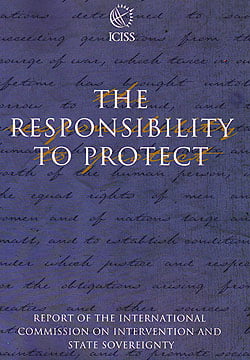
NATO's "Humanitarian Intervention"
Mandate defined in an ICISS report on R2P
Public opinion is largely unaware of the grave implications of these war plans, which contemplate the use of nuclear weapons, ironically in retaliation to Iran's non-existent nuclear weapons program. Moreover, 21st Century military technology combines an array of sophisticated weapons systems whose destructive power would overshadow the nuclear holocausts of Hiroshima and Nagasaki. Lest we forget, the United States is the only country to have used nuclear weapons against civilians. Militarization at the global level is instrumented through the US military’s Unified Command structure: the entire planet is divided up into geographic Combatant Commands under the control of the Pentagon. According to former NATO Commander General Wesley Clark, the Pentagon’s military road-map consists of a sequence of war theaters: “[The] five-year campaign plan [includes]... a total of seven countries, beginning with Iraq, then Syria, Lebanon, Libya, Iran, Somalia and Sudan.” Like a cancer, the US war unleashed in 2003 on Iraq is mutating into a global disease.
While The New York Times and other mainstream media outlets hailed 15 December 2011 as marking the “official” end of the nearly nine-year US war in Iraq, in reality that devastated country will remain an American war theater for the foreseeable future. Pentagon military advisers and contractors will continue to reside there and the people of Iraq will for generations be left with a legacy of US-imposed conflict and barbarity. The Pentagon’s “shock and awe” campaign in Iraq may have subsided, but its repercussions and criminal precedents are still very much extant, not only in Iraq but in the wider region and, increasingly, globally.
The 2000 Project for the New American Century (PNAC), which was the backbone of the NeoCon's agenda, was predicated on “waging a war without borders”. The PNAC's declared objectives were to “fight and decisively win multiple, simultaneous major theater wars” in different regions of the world as well as perform the so-called military “constabulary” duties “associated with shaping the security environment in critical regions”. Global constabulary implies a worldwide process of military policing and interventionism, including covert operations and “regime change”.
This diabolical military project formulated by the NeoCons was adopted and implemented from the very outset of the Obama administration. With a new team of military and foreign policy advisers, Obama has been far more effective in fostering military escalation than his White House predecessor, George Bush Junior, who has recently been condemned by the Kuala Lumpur War Crimes Tribunal for “Crimes against the Peace”.
This continuum of military agenda testifies to the fact that the two governing parties in the US, Democrat and Republican, are but two sides of a centrally planned military-industrial complex that is impregnable to the opinions, desires and interests of the American electorate.
Military Escalation and Preview of this Book
Contrary to the myth of “the good war”, we show in this Interactive Reader that the US entry into World War II was a deliberate strategy for self-serving imperialist gains. While the men and women who fought that war may have had moral convictions, the planners in Washington were operating on calculations of geopolitical control that had little to do with morals or legal principles – see the essays by Jacques Pauwels. The dropping of atomic bombs on Japan by the US in August 1945, obliterating hundreds of thousands of civilians, was an act of heinous barbarity that reflected the callousness of America's imperial design. The nuclear holocaust also set the nefarious parameters of the subsequent Cold War that gripped the world for nearly five decades following World War II. Essays by Brian Willson, Alfred McCoy and Michel Chossudovsky illustrate how the Pentagon’s genocidal wars in Asia were a continuation of America’s imperialist design – albeit under the cover of the Cold War against the Soviet Union.
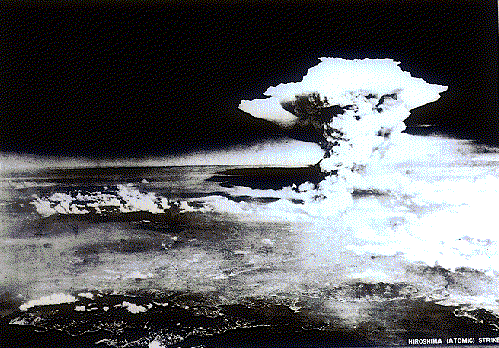
Hiroshima mushroom cloud. By executive order of President
Harry S. Truman, the U.S. dropped the nuclear bomb "Little Boy"
on Hiroshima, Monday, August 6, 1945
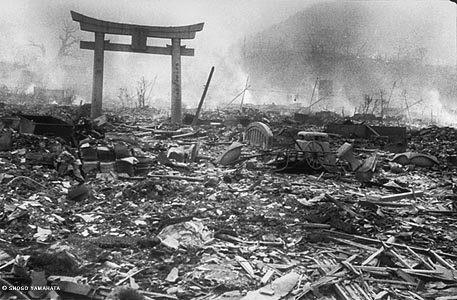
Nagasaki, August 9, 1945 
Survivors: August 1945. In the wake of Hiroshima
The fall of the Soviet Union may have brought an end to the Cold War, but soon the US would find new pretexts for waging war on the world and asserting hegemony on behalf of its capitalist allies. These new pretexts included “upholding international law” as in the First Gulf War against Iraq that Bush Senior embarked on in 1990, presaging the Second Gulf War that Bush Junior would reprise in 2003. And the US planners innovated the “humanitarian” pretext for the invasion of Somalia in 1991 and NATO’s war on Yugoslavia – see the essay by Sean Gervasi among others. In many ways, the “humanitarian war” in Yugoslavia served as the prototype for NATO’s 2011 military attack on Libya and what appears to be an imminent onslaught against Syria – see essays by Rick Rozoff and Mahdi Darius Nazemroaya. To the Pentagon’s silo of propaganda justifying “wars without borders” we have the additional pretexts of the “global war on terrorism” and “pre-emptive strikes against weapons of mass destruction”. Fittingly, as Washington’s wars multiply, so too it seems have the phony pretexts for these wars, as the essays on Iraq and Afghanistan by Felicity Arbuthnot and Jack Smith reveal. Permanent Belligerence: The Globalization of War
In Part VII, which also serves as the title of this Online Interactive E-Reader, The Globalization of War, we show how American-led imperialism has evolved from bloody bouts of episodic militarism over several decades to the present day state of permanent belligerence, with wars or war-making stretching from North and East Africa into the Middle East and Central Asia and beyond to Eurasia (Russia), the Far East (China) and Arctic (Russia again) – See the essays by James Petras, Rick Rozoff, Peter Dale Scott, F. William Engdahl, Finian Cunningham, the interview with Fidel Castro, Michel Chossudovsky and Jules Dufour.
Of most immediate concern are the ongoing American-led war plans within the broader Middle East/Central Asian region involving coordinated actions against Iran, Syria and Pakistan – see essays by Michel Chossudovsky, Tom Burghardt, Rick Rozoff and Mahdi Nazemroaya. Were these war plans to be carried out, this would lead to an extended regional war theater. The three existing and distinct war theaters (Iraq, Afghanistan and Palestine) would merge into a broad regional war extending from the Lebanese-Syrian East Mediterranean coastline to the Afghanistan-Pakistan border with Western China. Israel, Lebanon and Turkey would be engulfed in a conflict that would herald World War III.
Building an Effective Antiwar Movement
Meanwhile, the antiwar movement is in crisis: civil society organizations are misinformed, manipulated or co-opted. A large segment of “progressive” opinion is supportive of NATO’s R2P “humanitarian” mandate to the extent that these war plans are being carried out with the “rubber stamp” of civil society.
There is an urgent need to rebuild the antiwar movement on entirely new premises.
The holding of mass demonstrations and antiwar protests is not enough. What is required is the development of a broad and well-organized grassroots antiwar network, across the land, nationally and internationally, which challenges the structures of power and authority. People must mobilize not only against the military agenda – the authority of the state and its officials must also be challenged.
Challenging and defeating the US/NATO global war agenda is profoundly predicated on the mass of people in Western countries asserting democratic governance and the genuine “rule of the people”. It will involve the mass of people breaking out of the two-party charade that hitherto passes for “democracy” – not only in the US but also in other Western states – to form new political organizations that truly represent the needs and interests of the majority of people. War-making, as with servile abeyance to corporate and financial elites, is endemic to the dominant political parties. It must be realized that voting for these same parties has become futile as a means to effect democratic change.
One practical way forward is for citizens to empower themselves legally. It should be understood that whatever its justification, war is a “Crime against the Peace” under Nuremberg. George Walker Bush and former British Prime Minister Anthony L. Blair have been condemned by the Kuala Lumpur War Crimes Tribunal for waging a criminal war of aggression against Iraq. They are war criminals and citizens' initiatives that are growing across the world for the arraignment of Bush and Blair are one practical step towards mobilizing a popular challenge to the war system.

War crimes, however, are not limited to the former US president and British prime minister. There are "New War Criminals on the Block". They include the current president of the United States, Barack Obama, among others. The acting heads of state and heads of government who support US-NATO-Israel wars of aggression are also war criminals under international law. This proposition, which consists in unseating the war criminals in high office, is central to the waging of an effective antiwar movement.It is also our intention to show citizens that the root cause of war lies in the prevailing, but failing, global capitalist economic system – the very system that is not only destroying lives in foreign countries but which is destroying the material and moral foundations of Western society.
We hope that this Interactive Reader, The Globalisation of War, will empower citizens to mount an all-encompassing social movement against this diabolical military agenda and for the establishment of real democracy.
Michel Chossudovsky and Finian Cunningham, December 2011
In the face of blatant media disinformation, a "Re-Learning Process" must be launched.
It is our hope that the Interactive Reader Series will become a useful tool for high school, college and university students.
TABLE OF CONTENTS
PART I. THE HISTORY OF WAR: FROM WORLD WAR II TO THE COLD WAR ERA
 | Why World War II ended with Mushroom Clouds 65 years ago, August 6 and 9, 1945: Hiroshima and Nagasaki - by Jacques R. Pauwels - 2010-08-06 |
| The unspoken objective of the atomic bomb was US Hegemony in Asia and the Pacific |
 Korea and the "Axis of Evil" Korea and the "Axis of Evil"
- by Brian S. Willson - 2006-10-12 "Over a period of three years or so we killed off - what - twenty percent of the population [of North Korea]" (General Curtis Lemay) |
|
 | Who won the Vietnam War? - by Prof. Michel Chossudovsky - 2005-04-26 |
| Vietnam never received war reparations payments from the U.S. for the massive loss of life and destruction, yet an agreement reached in Paris in 1993 required Hanoi to recognize the debts of the defunct Saigon regime. This agreement is in many regards tantamount to obliging Vietnam to compensate Washington for the costs of war. |
PART II. NATO'S WAR IN THE BALKANS
 | Why Is NATO In Yugoslavia? - by Sean Gervasi - 2010-09-12 |
| The late Sean Gervasi had tremendous foresight. He understood NATO enlargement several years before it actually unfolded into a formidable military force. |
PART III. THE POST 9/11 ERA: AMERICA'S "WAR ON TERRORISM"
PART IV. IRAQ AND THE AF-PAK WARS
PART V. THE CONQUEST OF AFRICA
PART VI. US NATO-ISRAELI THREATS: PRE-EMPTIVE WAR AGAINST IRAN AND SYRIA
PART VII. THE GLOBALIZATION OF WAR
About the Editors
Michel Chossudovsky is an award-winning author, Professor of Economics (Emeritus) at the University of Ottawa. He is the Founder and Director of the Centre for Research on Globalization (CRG), Montreal and Editor of the globalresearch.ca website. He is the author of The Globalization of Poverty and The New World Order (2003) and America's "War on Terrorism"(2005). His most recent book is entitled Towards a World War III Scenario: The Dangers of Nuclear War (2011). He has taught as Visiting Professor at universities in Western Europe, South East Asia and Latin America, acted as an adviser to governments of developing countries and as a consultant for the several international organizations. Prof. Chossudovsky is a signatory of the Kuala Lumpur declaration to criminalize war and recipient of the Human Rights Prize of the Society for the Protection of Civil Rights and Human Dignity (GBM), Berlin, Germany. He is also a contributor to the Encyclopaedia Britannica. His writings have been published in more than twenty languages. Finian Cunningham is currently Global Research's Middle East and East Africa Correspondent. He has written extensively on international affairs. Previously, he was based in Bahrain and witnessed the upheavals in the Persian Gulf kingdom during 2011 as well as the subsequent Saudi-led brutal crackdown against pro-democracy protests. He is now based in East Africa.
